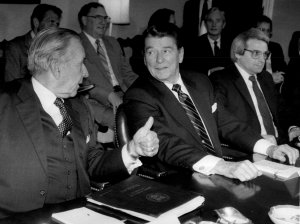Dennis Daly: 1985 had begun with the Presidential inauguration, forced inside because of bitterly cold weather in Washington, D.C. It was President Reagan's second swearing-in, and only the first time since the Nixon Administration that a President had served two terms. It would become a very busy year for the Reagan Administration, as UPI Radio's White House Correspondent, Bill Small, tells us …
Bill Small: Dennis, 1985 took Ronald Reagan to the heights and to the depths. He was sworn in for a second term, and he talked peace in Geneva with the leader of the Soviet Union; but he also had to undergo major cancer surgery, and he found his number-one domestic policy initiative blocked in Congress by members of his own political party.
In late November, Mr. Reagan and Soviet leader Gorbachev traveled to Geneva. Following in the footsteps of numberless national leaders who over the centuries have met there to look for a way to live in peace. When Mr. Reagan returned, he spoke to a joint session of Congress …
President Ronald Reagan: "I can't claim that we had a meeting of the minds on such fundamentals as ideology or nation purpose; but we understand each other better, and that's a key to peace."
Bill Small: There were few concrete results from the Summit; but both sides agreed to keep talking, and the two leaders agreed to Summit meetings in each of the next two years.
In July, doctors found a large polyp in Mr. Reagan's colon and removed it, along with two feet of the colon. The biopsy results came from Dr. Steven Rosenberg …
Dr. Steven Rosenberg: "The President has cancer."
Bill Small: Later, Mr. Reagan had to have two patches of skin cancer removed from his nose.
Perhaps Mr. Reagan's biggest disappointments this past year came from Capitol Hill. Despite his objections, Congress began putting together a series of economic sections to show U.S. disgust for the South African system of apartheid. The President eventually announced some sanctions of his own.
Congress also defied the President in issues involving international trade. Protectionist sentiments in Congress pushed Mr. Reagan to announce a series of measures to stem that tide ...
President Ronald Reagan: "It is wrong for the American worker and American businessman to continue to bear the burden imposed by those who abuse the world trading system."
Bill Small: But Congress defied threats of vetoes and sent Mr. Reagan a bill to cut import of shoes, textiles and copper; his spokesman promised a veto.
Mr. Reagan's biggest Congressional letdown came on a plan to reform the nation's tax-reform system, the capstone of his domestic-policy agenda. The Administration worked with the Chairman of the democratically controlled House Ways and Means Committee to produce a tax-reform bill, and Mr. Reagan called for action …
President Ronald Reagan: "As for America's fair-share tax plan, we are shooting for Christmastime. Economic growth and tax fairness are gifts we owe ourselves and our children."
Bill Small: But it was not to be. House Republicans, irritated because they felt left out of the tax-reform process, defied the President and voted not to let the tax-reform bill come to the floor of the House. Spokesman Larry Speaks tried to put a good face on it all …
Larry Speaks: Sometimes they differ with us, sometimes we differ from them, sometimes we both differ with each other, and that's gonna happen from time to time."
(00:05:00)
Bill Small: But in private, Mr. Reagan was described as "steaming", and one official was quoted to saying Mr. Reagan would neither forgive nor forget what the House Republicans had done. In the last few days of the Congressional session, the White House and Republican leaders frantically sought a compromise to keep tax reform alive, with few prospects of success.
Mr. Reagan was successful in urging support of a controversial plan to put mandatory limits on the Federal deficit over the next five years. He stumped hard for the Gramm-Rudman-Hollings Bill, but he signed it into law in private, handing out a written statement warning of substantial program cuts this coming year and noting several questions about the constitutionality of the bill. Almost as Mr. Reagan raised those questions, Democratic Congressman Mike Synar of Oklahoma was filing suit in Federal Court, charging that the bill is unconstitutional.
This is Bill Small at the White House.











